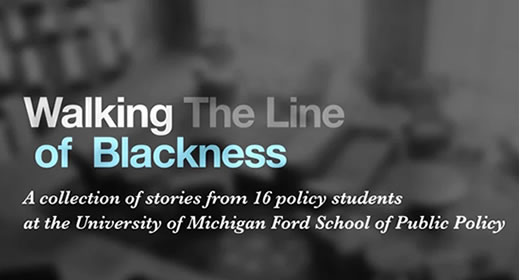
By Deborah Meyers Greene, Public Affairs
"Walking the Line of Blackness," a 20-minute video created by and featuring graduate students from the Gerald R. Ford School of Public Policy, puts their direct, personal experiences with racism in focus. Their intent is to contribute to the national discourse about race, here and throughout academia in the U.S.
"I'm proud of the students who created this film," said Ford School Dean Susan M. Collins. "They bravely share deeply personal, often painful experiences. My hope is that their courage helps others understand and address issues around race in the United States."
The video begins with Peter Haviland-Eduah, who did his undergraduate studies at Union College, a small school in upstate New York. One of the 4 percent of those students who were African American, a member of student government, lettered athlete in three sports, and a work-study staffer with the campus police force, he was well-liked, admired, and broadly known.
In the video, Haviland-Eduah recalls an evening when he and a group of friends were stopped by a Union police officer who asked three of them for their student identification."
"We came to realize that he had only asked the black men in the group to produce their identification. Had he asked some of the white people who were with us, they weren't students and they technically weren't supposed to be on campus. But that didn't matter because of the color of their skin."
"My parents warned me about things like that while I was growing up. It hit me at that moment that I was coming into adulthood," Peter said in a recent interview.
Fifteen more Ford graduate students contribute their experiences, including Chanera Yvonne Pierce, who recalls the summer night she was questioned and followed by a police officer less than a block from her apartment in Washington, D.C., where she held an internship with a national social justice agency.
Instead of someone walking home from work, the policeman assumed "I was actually a prostitute who frequented the area," she continues in the video. "No matter what I do, no matter how smart I purport myself to be, I will still always be looked at as the worst, the least of, the utter scum of society."
"When I think of being black in America, as a black man, I walk around, whether it's here at Michigan or professionally, you realize how many of you there aren't," says Matthew Alemu.
"What it does to the psyche — when you're one of six, one of four, in the 7 percent of diversity at an institution — creates a lot of insecurity and requires you to carry a lot of baggage in every situation and classroom you enter," said one of the video organizers Maron Alemu. "Insecurity comes with the fear of fulfilling a stereotype of being the dumb black kid, angry black woman, the unqualified affirmative action kid … and that's why diversity is so important. "
The video initiative came about, "after our community conversation at Ford, responding/reflecting on the tragic deaths of Eric Garner and Michael Brown," recalls Maron Alemu in a recent email interview. "A group of students (many featured in the film) got together to discuss how to channel our frustration, pain, and disappointment into something productive."
Their conversations quickened in the months following the Garner and Brown incidents in summer 2014, as additional seemingly similar incidents occurred in fall 2014 and winter 2015.
"We felt like a discussion was missing on the black lived experience," said James Schneidewind. As a white ally, Schneidewind — whose grandfather was active with the Southern Christian Leadership Conference in the 1960s — questioned what role to play. Feeling that, "sometimes silence can be seen as complicit," he soon joined the collaboration to produce the video with Maron Alemu and Haviland-Eduah.
"Many components of this process taught me so much more," said Maron Alemu. "From drafting questions, meeting to film with individuals, get administration's support — really taught me how hard it is to have a constructive, respectful, and safe conversation around race in this country."
Toward the end, the video participants are asked, "What changes would give you a greater sense that black lives do, indeed, matter?"
"Conversation can't start and stop in schools. It has to continue in communities, in workplaces, homes and beyond. If we want to get to a place of common human understanding, the only way to shape that is in communicating those different lived experiences in the places where we meet and interact," said Maron Alemu. "We have to confront our own biases, understand how status quos of practices of institutions may perpetuate some of these biases."